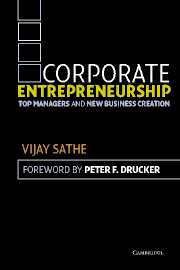Book contents
- Frontmatter
- Contents
- List of figures
- List of tables
- Foreword
- Preface
- List of abbreviations
- 1 Introduction
- 2 Why a consistent emphasis and approach for new business creation is beneficial but difficult to achieve
- I The business environment
- II The management culture
- 5 Shared beliefs about rewards, risks, opportunities, and rule-bending
- 6 Shared beliefs about control and learning
- III The corporate executives
- IV The division general manager
- V The division and its top management team
- VI Putting it all together
- Notes
- Bibliography
- Index
5 - Shared beliefs about rewards, risks, opportunities, and rule-bending
Published online by Cambridge University Press: 22 September 2009
- Frontmatter
- Contents
- List of figures
- List of tables
- Foreword
- Preface
- List of abbreviations
- 1 Introduction
- 2 Why a consistent emphasis and approach for new business creation is beneficial but difficult to achieve
- I The business environment
- II The management culture
- 5 Shared beliefs about rewards, risks, opportunities, and rule-bending
- 6 Shared beliefs about control and learning
- III The corporate executives
- IV The division general manager
- V The division and its top management team
- VI Putting it all together
- Notes
- Bibliography
- Index
Summary
This chapter examines how shared beliefs about rewards, risks, opportunities, and rule-bending influence new business creation (Table 5.1).
Big financial incentives hurt new business creation
Many people believe that corporate entrepreneurs must be rewarded in the same way as “Silicon Valley” independent entrepreneurs, with big financial incentives to offset the big personal risks of failure. This is a flawed assumption, even for independent entrepreneurs, because some of them don't have much to lose, and for others the opportunity costs are quite low because there is not much else they can do or want to do. If their perceived risk or opportunity cost is low, big financial incentives are not needed to motivate independent entrepreneurs.
In any case, the belief that independent entrepreneurship and corporate entrepreneurship require similar incentives is flawed – because there are significant differences between the two. The independent entrepreneur may seek rewards — such as the pride of starting one's own business and leaving it to posterity – that the corporation cannot hope to match. Also, as founder/owner, the independent entrepreneur's right to reap big financial gains in return for creating the company's wealth and its jobs is generally acknowledged by others. The corporate entrepreneur does not have the same right in the eyes of his or her associates because the corporate entrepreneur relies on resources that he neither paid for nor helped to create in the way that the independent entrepreneur did.
- Type
- Chapter
- Information
- Corporate EntrepreneurshipTop Managers and New Business Creation, pp. 63 - 79Publisher: Cambridge University PressPrint publication year: 2003



